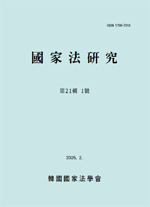본 연구는 ‘좋은 행정’의 개념을 고정된 정의로 단정하기보다, 법학, 행정학, 정치학, 사회학, 법경제학 등 다양한 학문 분야의 관점을 학제적으로 통합하여 재구성하는 데 목적을 둔다. 특히 법치행정, 적법절차, 예측 가능성과 투명성, 시민 참여, 정의와 공정 성, 효율성과 성과 등 여섯 가지 요소를 중심으로, ‘좋은 행정’이 갖추어야 할 헌법적 요 건들을 도출하고, 그 법제도적 실현 가능성을 분석하였다. 본 연구는 유럽연합 기본권헌장 제41조와 대한민국의 헌법, 「행정절차법」, 「행정기 본법」, 「공공기관의 운영에 관한 법률」을 중심으로 비교·검토하였으며, ‘좋은 행정’이 단 지 절차적 합법성에 그치지 않고, 실질적인 기본권 보호, 시민 신뢰 회복, 그리고 성과 중심의 행정 운영을 동시에 달성해야 한다는 점을 강조한다. 행정은 법의 지배 아래에 서 작동하되, 그 자체가 공공성과 정의, 전문성과 효율성이라는 가치들 사이의 긴장과 균형을 조율하는 동적인 구조임을 확인하였다. 이러한 논의들을 종합할 때, ‘좋은 행정’의 요건은 법치행정의 원리와 법의 지배, 행정의 투명성과 예측 가능성, 법적 안정성과 일관성 및 구체적 타당성을 위한 탄력성과의조화, 적법절차의 원리, 정의와 공정성, 시민참여와 민주적 통제, 보장국가와 제어국가내지 스마트국가의 발전단계에서 보듯이 효율성과 성과의 확보 및 제어행정의 스마트한활용 등 핵심 가치로 수렴된다. 이들은 상호 긴장 관계에 있으면서도 조화롭게 작동할때 비로소 헌법적 정당성과 실효성을 겸비한 행정이 가능하다는 점에서 의미를 지닌다. 아울러 현행 법제는 정보공개의 실효성, 규제의 일관성과 예측 가능성, 성과 평가의질적 기준 등에 있어 여전히 미흡한 점이 존재하며, 이로 인해 국민의 행정 접근성과 행정 신뢰도가 제약되고 있다. 이에 따라 본 연구는 입법론적 개선 과제로서 절차의 간소화, 디지털 기반의 정보 접근성 확대, 공무원의 책임 부담 완화 및 행정 전문성 강화를위한 법제도 정비의 필요성을 제안하였다. 결론적으로, 본 연구는 ‘좋은 행정’을 구성하는 규범적 기준과 제도 설계의 방향을 종 합적으로 정리함으로써, 향후 입법·행정·사법 각 영역에서 실천 가능한 헌법적 이정표를제공하고자 한다.
This study aims to reconstruct the concept of “good administration” through an interdisciplinary approach, integrating perspectives from law, public administration, political science, sociology, and law and economics. Rather than presenting a fixed definition, it identifies six core elements of good administration—rule of law, due process, transparency and predictability, civic participation and democratic accountability, fairness and justice, and administrative efficiency and performance— and examines how these normative values are translated into practical institutional standards. Drawing on the Charter of Fundamental Rights of the European Union and key Korean statutes such as the Constitution, the Administrative Procedures Act, the Framework Act on Administrative Regulation, and the Act on the Management of Public Institutions, this study analyzes how good administration can be normatively grounded and legally implemented in the Korean context. It highlights that good administration is not merely about legal formality or procedural correctness, but about achieving substantive protection of fundamental rights, enhancing institutional trust, and realizing effective and balanced governance. The study concludes that the core requirements of good administration must be seen as an integrated value system—one that harmonizes rule of law, legal stability and flexibility, transparency, fairness, democratic participation, and smart regulatory capability within a modern administrative state. Recognizing the limitations of the current legal framework in areas such as access to information, qualitative performance evaluation, and overly complex administrative procedures, the paper suggests legislative reforms including simplification of procedures, expansion of digital accessibility, and institutional safeguards to promote trust and responsibility in public administration.
Ⅰ. 머리말
Ⅱ. 좋은 행정의 의의를 둘러싼 학제간 법이론적 논의
Ⅲ. 좋은 행정과의 비교개념들에 대한 검토
Ⅳ. 학제적 연구를 통해 본 좋은 행정의 요건
Ⅴ. 결 론
(0)
(0)
